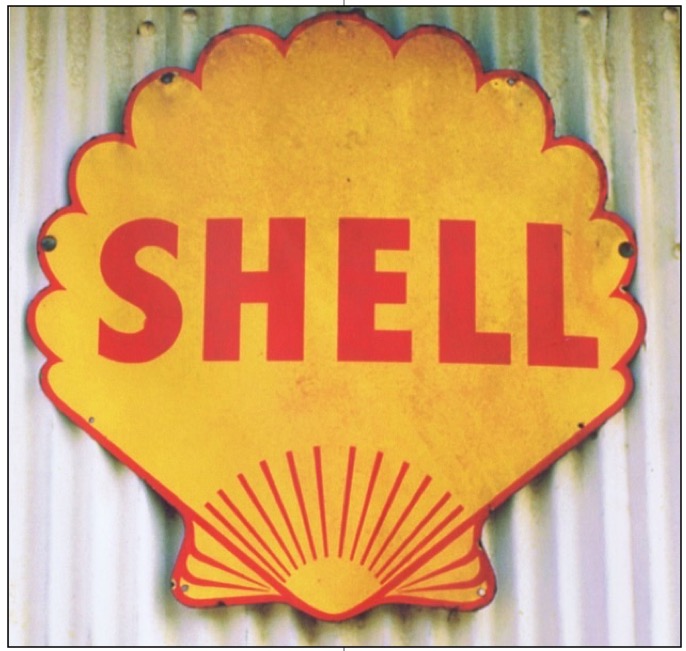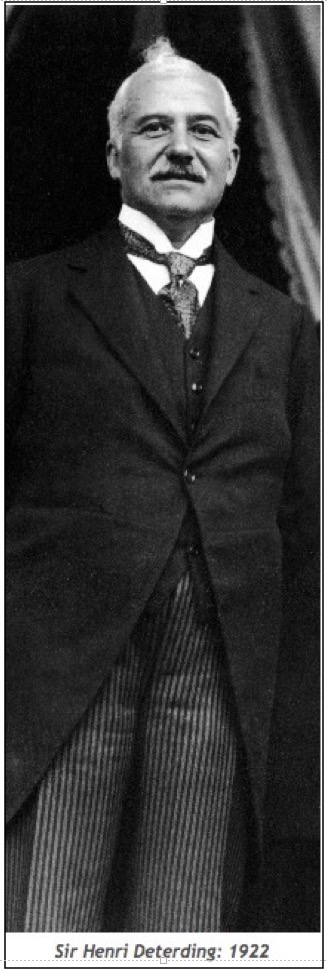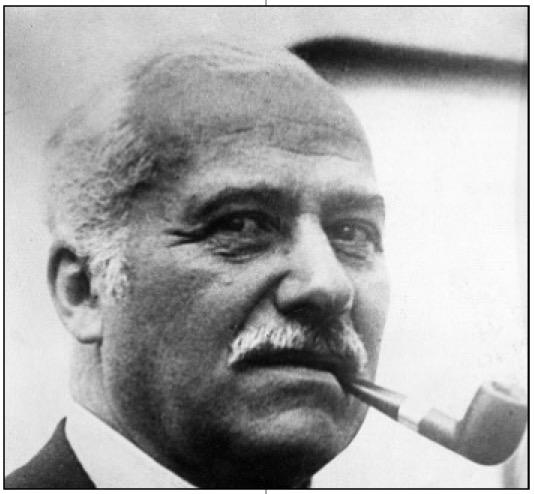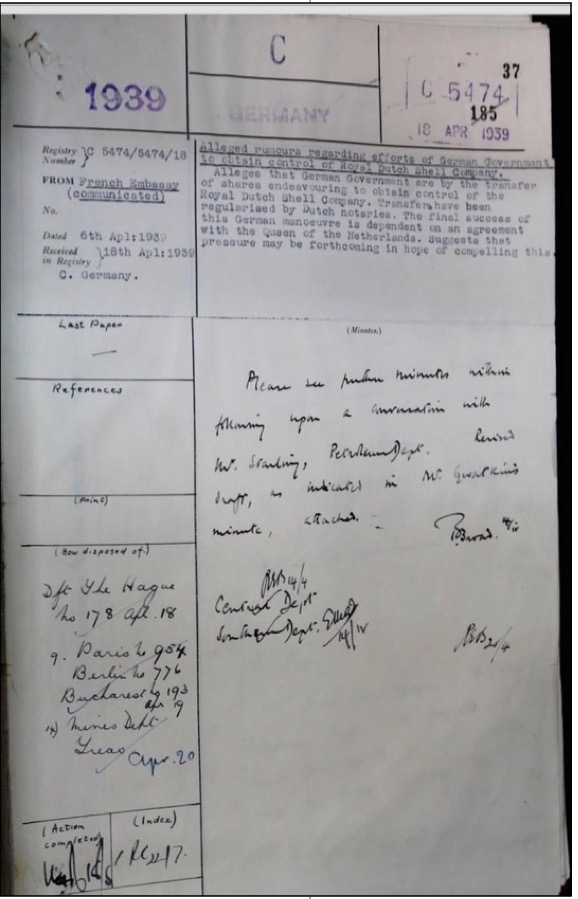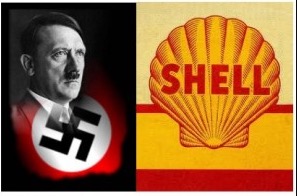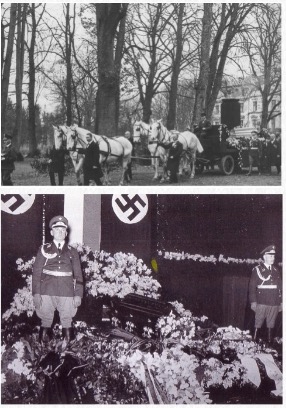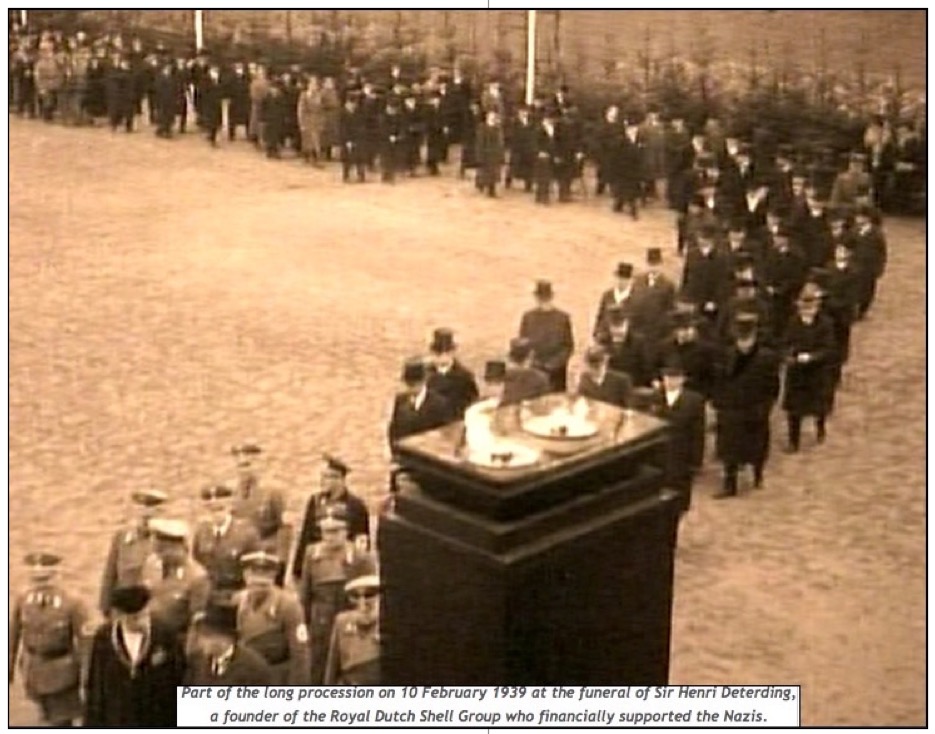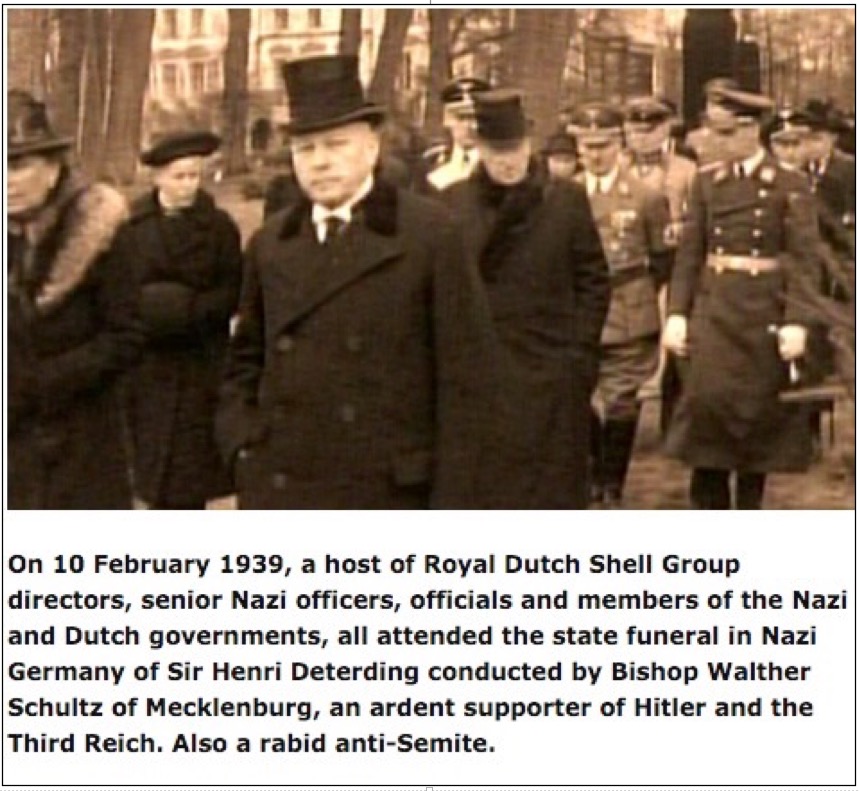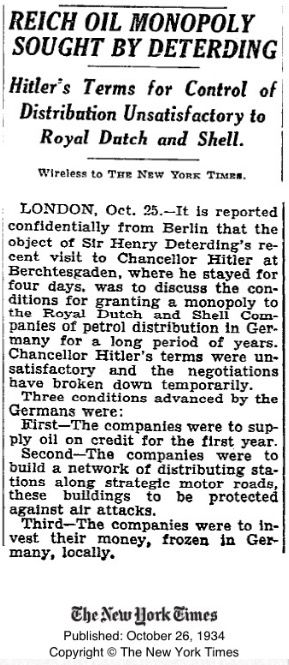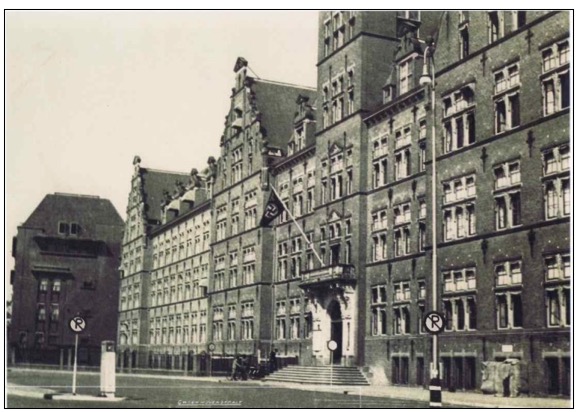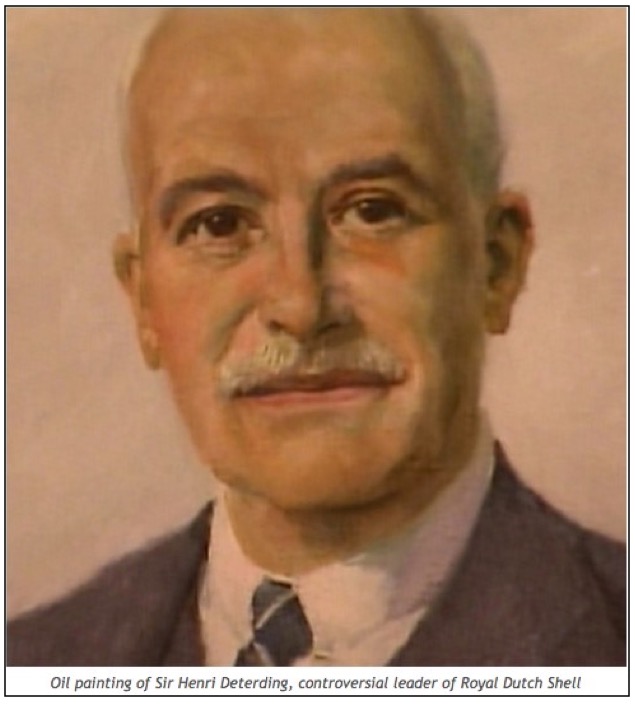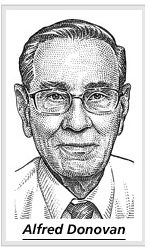This chapter deals with the role of Royal Dutch Shell as a contributor to the economy of Nazi Germany and financier of the Third Reich via its long-time Director General, Sir Henri Deterding. The funding was of a scale that led to Hitler paying homage to him as a great friend of the Germans. Sir Henri actively supported the rearmament of Nazi Germany. He was a generous friend that the Nazis tried to exploit even after his death.
Any major company in existence for over 100 years is bound to have some skeletons in the closet. In the case of Royal Dutch Shell, it arguably includes indirect responsibility for millions of deaths.
The horrific fatalities include the deaths of over 5.7 million Jewish people in the Holocaust.
To save the Nazi Party from collapse, the Nazi leader of the Royal Dutch Shell Group, Sir Henri Deterding – donated funds generated by Shell gasoline sales around the globe.
Declassified US intelligence records revealed that Royal Dutch Shell was viewed as “a Nazi collaborator that used Hitler’s slave laborers.”
Deterding won his knighthood in 1920 for Shell’s help to the British Admiralty in WW1. Shell cleverly fooled German submarines by transporting oil not in tankers, but as ballast instead of water, in ordinary ships.
This happened before Sir Henri became infatuated with Adolf Hitler and actively supported rearmament of Nazi Germany.
He was later said to be “a fervent admirer of Hitler” and “among the most notorious pro-Nazis…”
A New York Times article published in 1946 reported that as early as 1929, the Nazis had begun to try and make friends in Britain and a firm bond had been established with “Sir Henri Deterding, the oil magnate, and his associates.”
In 1933, Sir Henri was said to be “currying favor with Adolf Hitler in the hope of winning oil contracts for Royal Dutch Shell.”
In 1938, Sir Henri was openly described as being “pro-Nazi.”
Sir Henri was quoted as being “a Nazi supporter” in a New York Times article: entitled “Review/Television; The Epic Of Oil, Catalyst Of Conflict.” It was published on 11 January 1993.
Deterding’s support for Hitler stemmed in part from his quest for new oil fields.
Also in 1938, the year before his death, Sir Henri was described as “The Most Powerful Man in the World.” This was the title of a biography by Glyn Roberts, whose impartiality was questioned.
A Time Magazine review about the launch of the Glyn Roberts biography states: “Roberts thinks his backing for Hitler and his admiration for Mussolini are based on his hatred of communism…”
Deterding admired Hitler’s ruthless dictatorship maneuvers, as is stated in this extract from page 478 of RDSH V1:
“Deterding clearly liked the New Order represented by the Nazis. He considered the notorious Night of the Long Knives in June 1934, when Hitler had a large number of his suspected party opponents brutally murdered, as a necessary step, confessing that it had increased his respect and veneration for the Nazi leader, if such were possible.”
Shell has itself recognized the potential danger of having a dominant leader. The following is an extract from an article published by Fortune magazine on 4 August 1997 reporting on “New Age” self-analysis therapy at Shell:
What kind of company chooses a Herkstroter? One with a long history in Europe, where men with too much power have caused world wars. Shell executives say that archive films showing the birthday celebrations of Henri Deterding, Shell’s last strong, single master, are eerily reminiscent of Hitler’s rallies. Indeed, Deterding harbored Nazi sympathies; had he not retired from Shell in 1936, the company’s subsequent history might have been different. “We in Europe have always had a fear of the strong man,” says Shell managing director van den Bergh.
There is plentiful evidence that Deterding did indeed act like a dictator.
Known as “an oil Napoleon” he was also described as “a despot.”
Deterding was Royal Dutch Shell. For decades, they were effectively one and the same.
Here is a description of Sir Henri Deterding from page 320 of the book “Who Financed Hitler”:
“Sir Henri was a short, stocky man with an ambitious, energetic, and effervescent personality. His rather large head seemed closely set on his body. Despite a headful of white hair and a bristly, trimmed white mustache, he seemed younger due to his ruddy complexion and black flashing eyes.”
Deterding had a gift for “financial manipulations.”
He was also described as a “consummate schemer.”
Deterding was an honored supporter of Hitler and also a friend of Field Marshall Göring. They lived near each other in Germany and went shooting together.
Deterding also had direct dealings with Dr. Alfred Rosenberg, the “chief Nazi ideologue” and head of the Nazi party office of foreign affairs.
A New York Times article published on 4 November 1934 reported a conversation between Deterding and Rosenberg, described in the article as “Chancellor Hitler’s mouthpiece.” Russia was one of the subjects discussed.
In a book published in 1934, “Nazism: An Assault on Civilization,” Rosenberg was described on page 223 as “Hitler’s chief of intrigue.”
In October 1940, The Glasgow Herald announced in its War Casualties column that the son of Sir Henri, Lieutenant Henry Deterding, had been reported missing while on active service with the Fleet Air Arm. It said he was the son of the oil king whom Hitler had described as the “great friend of the Germans.” The syndicated article also mentioned the wreath Hitler had sent to the funeral of Sir Henri. The headline stated: ‘SON OF “NAZIS FRIEND” MISSING.’
The same article, but with a different headline – “Naval officer son of oil king missing” – was published the same day in the Daily Express.
Until a recent revamp, there was an “Our History” section on Shell’s main website, which included a feature under the heading: “The early 20th century.”
Unsurprisingly, there was no reference in the feature to Shell’s financial support for Nazi Germany. No mention of the relationship between Deterding and Hitler; nothing whatsoever about Shell’s collaboration with the Nazis, nor the instigation of anti-Semitic policies against Shell employees. Those unpalatable facts are missing. Same applied to the Wikipedia article: “Royal Dutch Shell” when checked on 14 January 2016.
Likewise, no mention of the Nazi infatuation of Sir Henri Deterding, who the U.S. Embassy in Berlin described as “among the most notorious pro-Nazis of the early war period.” (Quote from the book “George Bush: The Unauthorized Biography”.)
Deterding, the ruthless oil baron responsible for the great enterprise, which is Royal Dutch Shell today, was mainly, though not solely responsible, for one of the darkest chapters in its long history.
Because of the volume of evidence I have assembled, Shell’s close association with the Nazis is now out in the open, and easily accessible.
Much better than being buried in archive storage and expansive history books, where Shell no doubt hoped the information would remain.
Selected extracts from an article by historian Marcel Metze published by Historical Newspapers in Oct 2005 provide more insight about Deterding:
He was a tycoon of mythical proportions, but his dubious relationships with fascists still overshadow his business achievements.
Deterding was a supporter of Benito Mussolini and provided financial support to the emerging Nazi Germany. That dubious friendship with fascism stuck to his image and still overshadows his business achievements. There is ample evidence that Deterding had contacts with the Nazi movement as early as the 1920s, but after Hitler came to power in 1933, he consciously began to seek it.
In 1934 he bought the Rittergut Dobbin in Mecklenburg, where he regularly invited Reichsmarschall Hermann Göring to hunt.
In 1990 the Koninklijke Nederlandse Petroleum Maatschappij – the Dutch arm of the group – published an anniversary book on the occasion of its 100th anniversary; in 1997 the British arm Shell Transport & Trading did the same. Both books show that the group still had mixed feelings about the CEO who was slipping towards Nazi sympathies.
And the shame is not over yet. A search via www.shell.com on all Shell websites worldwide leads to only 4 hits for the keyword ‘Deterding’.
In reality, Henri Deterding was a powerful dead man. The British Foreign Office immediately examined whether the priority shares held by him could fall into German hands. In order to prevent the Nazis from getting a grip on Royal Dutch / Shell, the priority shares were subsequently handed over to the other directors in a swift action – the details of which cannot yet be disclosed here.
End of extracts from the article by the historian Marcel Metze
DETERDING’S CONTROL OVER THE GROUP
According to a well-regarded book “The Prize,” by Daniel Yergin, Deterding was able, at the height of his powers, to bind the Board of Shell without their knowledge and consent (page 369).
This leads to the question – was his dictatorial position solely due to his dominant personality, or the power of a controlling shareholding? It was apparently a combination of both.
In this connection, a book published in 1998 described Sir Henri Deterding as “an oil tycoon with a controlling interest in Royal Dutch Petroleum and the Shell group.” (Extract from pages 187 and 188 of the book: “Hitler and Geli“)
I had also read of related UK Foreign Office concern over rumors circulating after Deterding’s death. It was said that his shares might fall into German hands and that as a consequence, the Group could pass under the Nazi sway. (Also on page 369 of Daniel Yergin’s book)
Shell’s historians discussed Deterding’s preference shares on pages 300 and 301 of RDSH V1 but not the speculation about Nazi designs on the Group. The only mention was relegated to the notes section, item 230 on page 537:
Deterding’s death immediately sparked speculations about his estate and the possibility that Nazi Germany might get hold of his Royal Dutch shares and use them to take hold of the company. These rumours died down only when Colijn assured the British envoy in The Hague. Sir Neville Bland, about the preference shares construction which protected Royal Dutch against any takeover attempt: NA Kew F0371/23087. The Royal Dutch directors held these shares for the duration of their tenure. and consequently Deterding had lost his shares upon his resignation.
Shell’s historians were either ignorant of the facts, or, to coin a phrase, “economical with the actualité.”
Determined to establish the truth, I sent a professional researcher to the UK National Archive. The following are extracts from UK Foreign Office Minutes dated April 1939.
Extract from page 37
FROM; French Embassy (communicated)
Alleged rumours regarding efforts of German Government to obtain control of Royal Dutch Shell Company.
Alleges that German Government are by the transfer of shares endeavouring to obtain control of the Royal Dutch Shell Company. Transfer have been regularised by Dutch notaries. The final success of this German manoeuvre is dependent on an agreement with the of the Netherlands. Suggests that pressure may be forthcoming in hope of compelling this.
Mr. Starling, Petroleum Department, has just rung up with regard to Monsieur Roche’s enquiry about the position of Sir Henri Deterding’s holding in the Royal Dutch Oil Co. He said that he had been told by Sir Andrew Agnew that certain preference shares giving some measure of control do, in fact, form part of Sir Henry Deterding’s estate. These shares are at present deposited in London; and the directors of the Royal Dutch Co. will meet shortly to decide what is to become of them.
I understand that there is no danger of these shares being handed over to Sir Henry Deterding’s heirs to do what they like with, nor yet of selling them outside the directorate of the company. But Sir Andrew A. Agnew thinks that the Germans (Sir Henry died in Germany and has presumably left an estate there as well as in England) have got wind of the existence of these shares and would like to get hold of them.
Sir Andrew Agnew CBE was the most senior managing director within the Group after Deterding. See page 487. He was a key figure within the Group and at one point had been concerned about Deterding promising Group supplies to Hitler. See page 486 RDSH V1.
What we know as a result of the information given to the Foreign Office by Sir Andrew Agnew on behalf of the Group, is the following:
- He believed the rumors were well founded.
- Sir Henry did at the time of his death own preference shares giving him a measure of control over Royal Dutch. Since Royal Dutch had a 60% interest in the Royal Dutch Shell Group, it follows that Deterding had a measure of control over the entire Group.
- Whoever had physical control of the shares deposited in London had no intention of handing them over to Deterding’s heirs, to whom they were apparently meant to go.
Were they deliberately deprived of their rightful inheritance?
As a result of this and other archive information, it is evident that at the time of his death, contrary to the picture painted by Shell historians distancing him from the Group, Sir Henri remained in a powerful position. He was still a director of multiple Group companies, was still intervening, and held preference shares giving him a measure of control over Royal Dutch and therefore also over the entire Royal Dutch Shell Group.
We can see why Hitler viewed Deterding as a great friend of the Germans. He had donated large sums to Nazi Germany. With his death occurring while married to his young German wife, with whom he was besotted, she would likely be the largest beneficiary of his estate, including his shareholdings.
It was a momentous time for the Group. An internal struggle for power and control was underway, with skullduggery used by Dutch directors against UK colleagues and vice-versa. See page 93 RDSH V2.
If made public, the intrigue over control of RDS had the potential to blow up into a major scandal given Deterding’s treasonous relationship with the Nazis. He had previously become a British citizen and was made a knight of the Realm for his services to Britain, but had died as a Nazis.
From page 44 dated 18th April, 1939
The three pages from the Foreign Office minutes are published with the kind permission of The National Archive.
ENDS
Copyright Notice: All rights, including copyright and compilation in the content of shellnazihistory.com web pages authored by John Donovan are owned or controlled for these purposes by him. In accessing the said web pages, you agree that you may only download the content for your own personal non-commercial use. Except where expressly stated otherwise, you are not permitted to copy, broadcast, download, store (in any medium), transmit, show or play in public, adapt or change in any way the content of these web pages for any other purpose whatsoever without the prior written permission of John Donovan via the email address: john@shellnews.net
shellplc.website and its sister non-profit websites royaldutchshellplc.com, royaldutchshellgroup.com, shellenergy.website, shellnazihistory.com, royaldutchshell.website, johndonovan.website, shellnews.net and shell2004.com are owned by John Donovan. There is also a Wikipedia feature.
